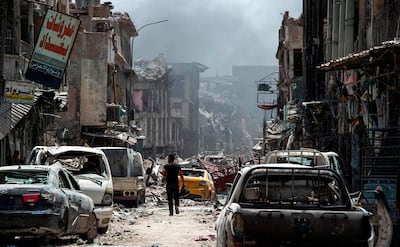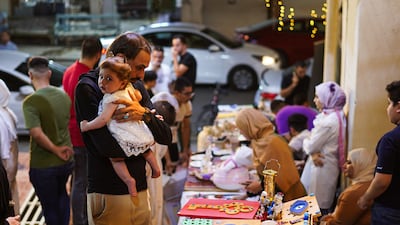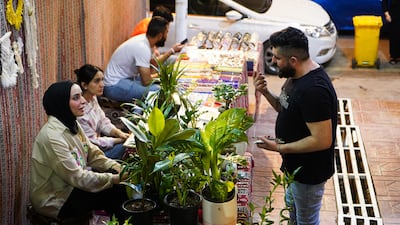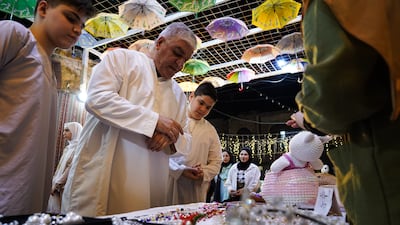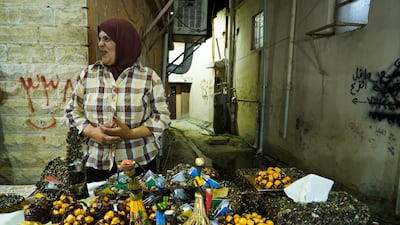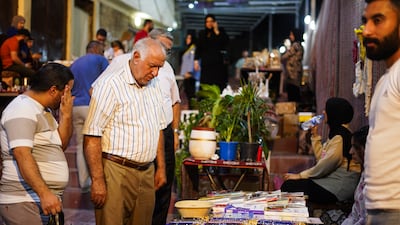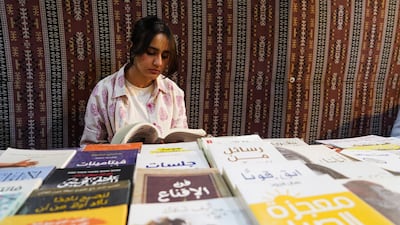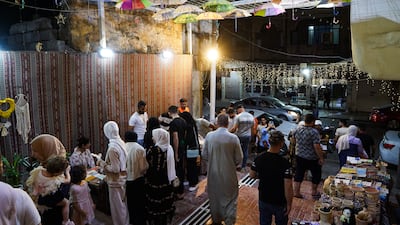Iraq's second city of Mosul, also known as the city or mother of two springs, is one that has witnessed a great deal of war and destruction in recent years. Following the US invasion, it suffered an even darker period after it was occupied by ISIS from 2014 to 2017.
Yet, the city has always remained a source of resilience, persevering through hardship and emerging stronger. Every catastrophe it has faced has resulted in a new hope; an indomitable force that is embodied by Barkah Bazaar, a not-for-profit initiative that gives the city's artisans a space to sell handmade crafts and other objects at a weekly market in the old town. The National caught up with its founder, Ahmed Al Habeeb, to find out more about the social project.
After his neighbourhood was liberated from ISIS, Al Habeeb felt the urge to “get out of the atmosphere of battles and terror and the lack of freedom during the dark era of ISIS".
As he waited for the rest of the city to be freed, he went to Baghdad to find a temporary job. While there, Al Habeeb was inspired by an exhibition specialising in handicrafts and artworks to bring a similar concept to his hometown.
Born into a family with deep passion for art, music and culture, Al Habeeb's father was both an agricultural engineer and a professional oud player and music teacher. He was also part of a wide social circle of artists and creatives. Although he grew up surrounded by music, painting and literature, Al Habeeb says he never achieved his own "ambitions in the field". He explains: "So I wanted to help others in fulfilling their dreams".
Once the entire city of Mosul was freed from ISIS, he sought the help of a friend to bring his dream to life. The process was made easier by the gradual return of normalcy to the city, especially with the reopening of the University of Mosul. This was their starting point in establishing the initial bazaar; which was enhanced by the students both volunteering and making handicrafts to be sold.
Al Habeeb explains that his goal from the very start was “to support those with technical and artistic skills and handicrafts, help them market their work, provide the appropriate space and atmosphere for that and promote their work via social media, as well as the bazaar”.
They held many bazaars and exhibitions both at the University of Mosul and other public places, including at festivals and other social events. As the idea gained popularity, the team decided to expand, giving rise to the Barkah Bazaar initiative; a market held every Friday evening.
During that time, the International Organisation for Migration was quite active in Mosul and was involved in the reconstruction of residential areas that were partially destroyed by the ISIS liberation battles. IOM also offered livelihood support and infrastructure rehabilitation to the private sector.
Deepika Nath, head of public information at IOM, explains what makes the initiative stand out: “There is truly a lot of talent in the city, despite the instability and wars, which negatively affected the cultural sector". She says the group has incorporated cultural bazaars into its programming across Iraq.
When Al Habeeb floated the idea by the group, it offered him support, starting with a batch of 15 plastic tables and seats, and made him the bazaar's volunteer project manager and co-ordinator.
Al Habeeb already had a team of about 80 people experienced in handicrafts, but he wanted to open the opportunity for other participants with a passion for creating traditional wares, as well as attracting tourists to visit the area and learn about the city of Mosul.
Today, at the bazaar, visitors can find all manner of goods – including handmade accessories, textiles, sustainable reshaped candles, paintings, utensils, glass cups, ornamental plants, pottery, old coins, stamps and clay mounds adorned with the old Sumero-Akkadian cuneiform script.
Anyone wishing to showcase and sell their work can register and reserve a stall through Barkah Bazaar's Facebook or Instagram pages for a fee of 5,000 dinars ($3.50). All revenue is fed back into the bazaar, and any profits generated go to the participants.
Al Habeeb says the project has received overwhelming support and co-operation from local people, and one resident even donated an entire warehouse for storing the stalls and chairs. Running every Friday from 4pm to 9pm, up to 300 people visit the bazaar every week and volunteers work tirelessly to clean up afterwards.
One of those volunteers is Hana Zakria, an accountant who came across the bazaar on Facebook. She says the market has helped to restore the "spirit and life" of the old city.
She explains: “It's located in Al-Shaarain market near the Prophet Zarzis Street, at the heart of the historic old part of Mosul, which was subjected to great destruction after the liberation of the city, but now it has been reconstructed and life has returned to it. The bazaar is specifically in an old market, for the purpose of encouraging people to visit these places.”
Zakria also has her own stall, where she showcases and sells her own traditional canvas paintings. She says participating at the bazaar is “one of the most beautiful things I have ever done, because it is a service to my city and a way to represent my city in the best way".
She adds: "No matter how difficult the circumstances, Mosul has risen again with its people and will continue to be proud as long as there are people who love it and work to present it in the best way.”
UAE%20Warriors%2033%20Results
%3Cp%3E%3Cstrong%3EFeatherweight%20title%3C%2Fstrong%3E%3Cbr%3EAli%20Al%20Qaisi%20by%20Jesse%20Arnett%20by%20submission%2C%20round%203%3Cbr%3E%3Cstrong%3EWelterweight%20title%3C%2Fstrong%3E%3Cbr%3EJosh%20Togo%20bt%20Tahir%20Abdullaev%20by%20unanimous%20decision%3Cbr%3E%3Cstrong%3EFlyweight%3C%2Fstrong%3E%3Cbr%3EIago%20Ribeiro%20bt%20Juan%20Puerta%20by%20unanimous%20decision%3Cbr%3E%3Cstrong%3EMiddleweight%3C%2Fstrong%3E%3Cbr%3EYerkin%20Darmen%20bt%20Tyler%20Ray%20by%20TKO%2C%20round%203%3Cbr%3E%3Cstrong%3EWelterweight%3C%2Fstrong%3E%3Cbr%3EAbdulla%20Al%20Bousheiri%20bt%20John%20Adajar%20by%20submission%2C%20round%201%3Cbr%3E%3Cstrong%3ECatchweight%20232lb%3C%2Fstrong%3E%3Cbr%3EAsylzhan%20Bakhytzhanuly%20bt%20Hasan%20Yousefi%20by%20submission%2C%20round%202%3Cbr%3E%3Cstrong%3ECatchweight%20176lb%3C%2Fstrong%3E%3Cbr%3EAlin%20Chirila%20bt%20Silas%20Robson%20by%20KO%2C%20round%201%3Cbr%3E%3Cstrong%3ECatchweight%20176lb%3C%2Fstrong%3E%3Cbr%3EArvin%20Chan%20bt%20Abdi%20Farah%20by%20TKO%2C%20round%201%3Cbr%3E%3Cstrong%3ELightweight%3C%2Fstrong%3E%3Cbr%3EOle-Jorgen%20Johnsen%20bt%20Nart%20Abida%20by%20TKO%2C%20round%201%3Cbr%3E%3Cstrong%3EBantamweight%3C%2Fstrong%3E%3Cbr%3EOtar%20Tanzilov%20bt%20Eduardo%20Dinis%20by%20TKO%2C%20round%203%3Cbr%3E%3Cstrong%3EStrawweight%3C%2Fstrong%3E%3Cbr%3EColine%20Biron%20bt%20Aysun%20Erge%20via%20submission%2C%20round%202%3Cbr%3E%3Cstrong%3EWelterweight%3C%2Fstrong%3E%3Cbr%3ESoslan%20Margiev%20bt%20Mathieu%20Rakotondrazanany%20by%20unanimous%20decision%3Cbr%3E%3Cstrong%3EBantamweight%3C%2Fstrong%3E%3Cbr%3EBakhromjon%20Ruziev%20bt%20Younes%20Chemali%20by%20majority%20decision%3C%2Fp%3E%0A
What can you do?
Document everything immediately; including dates, times, locations and witnesses
Seek professional advice from a legal expert
You can report an incident to HR or an immediate supervisor
You can use the Ministry of Human Resources and Emiratisation’s dedicated hotline
In criminal cases, you can contact the police for additional support
If you go
Flight connections to Ulaanbaatar are available through a variety of hubs, including Seoul and Beijing, with airlines including Mongolian Airlines and Korean Air. While some nationalities, such as Americans, don’t need a tourist visa for Mongolia, others, including UAE citizens, can obtain a visa on arrival, while others including UK citizens, need to obtain a visa in advance. Contact the Mongolian Embassy in the UAE for more information.
Nomadic Road offers expedition-style trips to Mongolia in January and August, and other destinations during most other months. Its nine-day August 2020 Mongolia trip will cost from $5,250 per person based on two sharing, including airport transfers, two nights’ hotel accommodation in Ulaanbaatar, vehicle rental, fuel, third party vehicle liability insurance, the services of a guide and support team, accommodation, food and entrance fees; nomadicroad.com
A fully guided three-day, two-night itinerary at Three Camel Lodge costs from $2,420 per person based on two sharing, including airport transfers, accommodation, meals and excursions including the Yol Valley and Flaming Cliffs. A return internal flight from Ulaanbaatar to Dalanzadgad costs $300 per person and the flight takes 90 minutes each way; threecamellodge.com
Ten tax points to be aware of in 2026
1. Domestic VAT refund amendments: request your refund within five years
If a business does not apply for the refund on time, they lose their credit.
2. E-invoicing in the UAE
Businesses should continue preparing for the implementation of e-invoicing in the UAE, with 2026 a preparation and transition period ahead of phased mandatory adoption.
3. More tax audits
Tax authorities are increasingly using data already available across multiple filings to identify audit risks.
4. More beneficial VAT and excise tax penalty regime
Tax disputes are expected to become more frequent and more structured, with clearer administrative objection and appeal processes. The UAE has adopted a new penalty regime for VAT and excise disputes, which now mirrors the penalty regime for corporate tax.
5. Greater emphasis on statutory audit
There is a greater need for the accuracy of financial statements. The International Financial Reporting Standards standards need to be strictly adhered to and, as a result, the quality of the audits will need to increase.
6. Further transfer pricing enforcement
Transfer pricing enforcement, which refers to the practice of establishing prices for internal transactions between related entities, is expected to broaden in scope. The UAE will shortly open the possibility to negotiate advance pricing agreements, or essentially rulings for transfer pricing purposes.
7. Limited time periods for audits
Recent amendments also introduce a default five-year limitation period for tax audits and assessments, subject to specific statutory exceptions. While the standard audit and assessment period is five years, this may be extended to up to 15 years in cases involving fraud or tax evasion.
8. Pillar 2 implementation
Many multinational groups will begin to feel the practical effect of the Domestic Minimum Top-Up Tax (DMTT), the UAE's implementation of the OECD’s global minimum tax under Pillar 2. While the rules apply for financial years starting on or after January 1, 2025, it is 2026 that marks the transition to an operational phase.
9. Reduced compliance obligations for imported goods and services
Businesses that apply the reverse-charge mechanism for VAT purposes in the UAE may benefit from reduced compliance obligations.
10. Substance and CbC reporting focus
Tax authorities are expected to continue strengthening the enforcement of economic substance and Country-by-Country (CbC) reporting frameworks. In the UAE, these regimes are increasingly being used as risk-assessment tools, providing tax authorities with a comprehensive view of multinational groups’ global footprints and enabling them to assess whether profits are aligned with real economic activity.
Contributed by Thomas Vanhee and Hend Rashwan, Aurifer
Who's who in Yemen conflict
Houthis: Iran-backed rebels who occupy Sanaa and run unrecognised government
Yemeni government: Exiled government in Aden led by eight-member Presidential Leadership Council
Southern Transitional Council: Faction in Yemeni government that seeks autonomy for the south
Habrish 'rebels': Tribal-backed forces feuding with STC over control of oil in government territory
Our legal consultant
Name: Hassan Mohsen Elhais
Position: legal consultant with Al Rowaad Advocates and Legal Consultants.
MATCH INFO
Quarter-finals
Saturday (all times UAE)
England v Australia, 11.15am
New Zealand v Ireland, 2.15pm
Sunday
Wales v France, 11.15am
Japan v South Africa, 2.15pm
Bridgerton%20season%20three%20-%20part%20one
%3Cp%3E%3Cstrong%3EDirectors%3A%20%3C%2Fstrong%3EVarious%3C%2Fp%3E%0A%3Cp%3E%3Cstrong%3EStarring%3A%3C%2Fstrong%3E%20Nicola%20Coughlan%2C%20Luke%20Newton%2C%20Jonathan%20Bailey%3C%2Fp%3E%0A%3Cp%3E%3Cstrong%3ERating%3A%20%3C%2Fstrong%3E3%2F5%3C%2Fp%3E%0A
The Vines - In Miracle Land
Two stars
Who are the Sacklers?
The Sackler family is a transatlantic dynasty that owns Purdue Pharma, which manufactures and markets OxyContin, one of the drugs at the centre of America's opioids crisis. The family is well known for their generous philanthropy towards the world's top cultural institutions, including Guggenheim Museum, the National Portrait Gallery, Tate in Britain, Yale University and the Serpentine Gallery, to name a few. Two branches of the family control Purdue Pharma.
Isaac Sackler and Sophie Greenberg were Jewish immigrants who arrived in New York before the First World War. They had three sons. The first, Arthur, died before OxyContin was invented. The second, Mortimer, who died aged 93 in 2010, was a former chief executive of Purdue Pharma. The third, Raymond, died aged 97 in 2017 and was also a former chief executive of Purdue Pharma.
It was Arthur, a psychiatrist and pharmaceutical marketeer, who started the family business dynasty. He and his brothers bought a small company called Purdue Frederick; among their first products were laxatives and prescription earwax remover.
Arthur's branch of the family has not been involved in Purdue for many years and his daughter, Elizabeth, has spoken out against it, saying the company's role in America's drugs crisis is "morally abhorrent".
The lawsuits that were brought by the attorneys general of New York and Massachussetts named eight Sacklers. This includes Kathe, Mortimer, Richard, Jonathan and Ilene Sackler Lefcourt, who are all the children of either Mortimer or Raymond. Then there's Theresa Sackler, who is Mortimer senior's widow; Beverly, Raymond's widow; and David Sackler, Raymond's grandson.
Members of the Sackler family are rarely seen in public.
Navdeep Suri, India's Ambassador to the UAE
There has been a longstanding need from the Indian community to have a religious premises where they can practise their beliefs. Currently there is a very, very small temple in Bur Dubai and the community has outgrown this. So this will be a major temple and open to all denominations and a place should reflect India’s diversity.
It fits so well into the UAE’s own commitment to tolerance and pluralism and coming in the year of tolerance gives it that extra dimension.
What we will see on April 20 is the foundation ceremony and we expect a pretty broad cross section of the Indian community to be present, both from the UAE and abroad. The Hindu group that is building the temple will have their holiest leader attending – and we expect very senior representation from the leadership of the UAE.
When the designs were taken to the leadership, there were two clear options. There was a New Jersey model with a rectangular structure with the temple recessed inside so it was not too visible from the outside and another was the Neasden temple in London with the spires in its classical shape. And they said: look we said we wanted a temple so it should look like a temple. So this should be a classical style temple in all its glory.
It is beautifully located - 30 minutes outside of Abu Dhabi and barely 45 minutes to Dubai so it serves the needs of both communities.
This is going to be the big temple where I expect people to come from across the country at major festivals and occasions.
It is hugely important – it will take a couple of years to complete given the scale. It is going to be remarkable and will contribute something not just to the landscape in terms of visual architecture but also to the ethos. Here will be a real representation of UAE’s pluralism.
GOLF’S RAHMBO
- 5 wins in 22 months as pro
- Three wins in past 10 starts
- 45 pro starts worldwide: 5 wins, 17 top 5s
- Ranked 551th in world on debut, now No 4 (was No 2 earlier this year)
- 5th player in last 30 years to win 3 European Tour and 2 PGA Tour titles before age 24 (Woods, Garcia, McIlroy, Spieth)
Mercer, the investment consulting arm of US services company Marsh & McLennan, expects its wealth division to at least double its assets under management (AUM) in the Middle East as wealth in the region continues to grow despite economic headwinds, a company official said.
Mercer Wealth, which globally has $160 billion in AUM, plans to boost its AUM in the region to $2-$3bn in the next 2-3 years from the present $1bn, said Yasir AbuShaban, a Dubai-based principal with Mercer Wealth.
“Within the next two to three years, we are looking at reaching $2 to $3 billion as a conservative estimate and we do see an opportunity to do so,” said Mr AbuShaban.
Mercer does not directly make investments, but allocates clients’ money they have discretion to, to professional asset managers. They also provide advice to clients.
“We have buying power. We can negotiate on their (client’s) behalf with asset managers to provide them lower fees than they otherwise would have to get on their own,” he added.
Mercer Wealth’s clients include sovereign wealth funds, family offices, and insurance companies among others.
From its office in Dubai, Mercer also looks after Africa, India and Turkey, where they also see opportunity for growth.
Wealth creation in Middle East and Africa (MEA) grew 8.5 per cent to $8.1 trillion last year from $7.5tn in 2015, higher than last year’s global average of 6 per cent and the second-highest growth in a region after Asia-Pacific which grew 9.9 per cent, according to consultancy Boston Consulting Group (BCG). In the region, where wealth grew just 1.9 per cent in 2015 compared with 2014, a pickup in oil prices has helped in wealth generation.
BCG is forecasting MEA wealth will rise to $12tn by 2021, growing at an annual average of 8 per cent.
Drivers of wealth generation in the region will be split evenly between new wealth creation and growth of performance of existing assets, according to BCG.
Another general trend in the region is clients’ looking for a comprehensive approach to investing, according to Mr AbuShaban.
“Institutional investors or some of the families are seeing a slowdown in the available capital they have to invest and in that sense they are looking at optimizing the way they manage their portfolios and making sure they are not investing haphazardly and different parts of their investment are working together,” said Mr AbuShaban.
Some clients also have a higher appetite for risk, given the low interest-rate environment that does not provide enough yield for some institutional investors. These clients are keen to invest in illiquid assets, such as private equity and infrastructure.
“What we have seen is a desire for higher returns in what has been a low-return environment specifically in various fixed income or bonds,” he said.
“In this environment, we have seen a de facto increase in the risk that clients are taking in things like illiquid investments, private equity investments, infrastructure and private debt, those kind of investments were higher illiquidity results in incrementally higher returns.”
The Abu Dhabi Investment Authority, one of the largest sovereign wealth funds, said in its 2016 report that has gradually increased its exposure in direct private equity and private credit transactions, mainly in Asian markets and especially in China and India. The authority’s private equity department focused on structured equities owing to “their defensive characteristics.”
HOW TO WATCH
Facebook: TheNationalNews
Twitter: @thenationalnews
Instagram: @thenationalnews.com
TikTok: @thenationalnews
RESULTS
5pm: Handicap (PA) Dh80,000 (Turf) 2,200m
Winner: Jawal Al Reef, Fernando Jara (jockey), Ahmed Al Mehairbi (trainer)
5.30pm: Handicap (PA) Dh80,000 (T) 1,600m
Winner: AF Seven Skies, Bernardo Pinheiro, Qais Aboud
6pm: Maiden (PA) Dh80,000 (T) 1,200m
Winner: Almahroosa, Fabrice Veron, Eric Lemartinel
6.30pm: Maiden (PA) Dh80,000 (T) 1,200m
Winner: AF Sumoud, Tadhg O’Shea, Ernst Oertel
7pm: Wathba Stallions Cup Handicap (PA) Dh70,000 (T) 1,200m
Winner: AF Majalis, Tadhg O’Shea, Ernst Oertel
7.30pm: Handicap (TB) Dh90,000 (T) 1,400m
Winner: Adventurous, Sandro Paiva, Ali Rashid Al Raihe
The Sand Castle
Director: Matty Brown
Stars: Nadine Labaki, Ziad Bakri, Zain Al Rafeea, Riman Al Rafeea
Rating: 2.5/5
More coverage from the Future Forum
